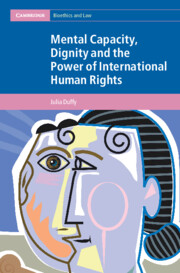Book contents
- Mental Capacity, Dignity and the Power of International Human Rights
- Cambridge Bioethics and Law
- Mental Capacity, Dignity and the Power of International Human Rights
- Copyright page
- Dedication
- Contents
- Acknowledgements
- Table of Cases
- Table of Treaties
- Abbreviations
- 1 Introduction and Background
- 2 Article 12 – Context and Background
- 3 The Principle of Indivisibility and Article 12
- 4 Article 12 and Autonomy
- 5 Article 12 and Dignity
- 6 Article 12 and Equality
- 7 Conclusion
- References
- Index
- Cambridge Bioethics and Law
2 - Article 12 – Context and Background
Published online by Cambridge University Press: 03 August 2023
- Mental Capacity, Dignity and the Power of International Human Rights
- Cambridge Bioethics and Law
- Mental Capacity, Dignity and the Power of International Human Rights
- Copyright page
- Dedication
- Contents
- Acknowledgements
- Table of Cases
- Table of Treaties
- Abbreviations
- 1 Introduction and Background
- 2 Article 12 – Context and Background
- 3 The Principle of Indivisibility and Article 12
- 4 Article 12 and Autonomy
- 5 Article 12 and Dignity
- 6 Article 12 and Equality
- 7 Conclusion
- References
- Index
- Cambridge Bioethics and Law
Summary
Chapter 2 explains the historical and contemporary policy, legal and human rights contexts for decision-making by, with and for adults with cognitive disability. It describes the dominant narrative in the literature as depicting a journey from paternalism to autonomy, from exclusion to inclusion, and from discrimination to equality, aligned with three widely recognised models of disability – the charity, medical and social models. It explains that the book’s interpretation of Article 12 is founded on the acceptance of a social model of disability that acknowledges the residual impacts of impairment. The chapter explains the limitations of arguments favouring an interpretation of Article 12 as requiring that decision-making by substitutes be abolished. Such arguments privilege autonomy at the expense of other important human rights values and privilege the civil and political right to legal capacity over other civil, economic, political, social and cultural human rights.
Keywords
- Type
- Chapter
- Information
- Publisher: Cambridge University PressPrint publication year: 2023

